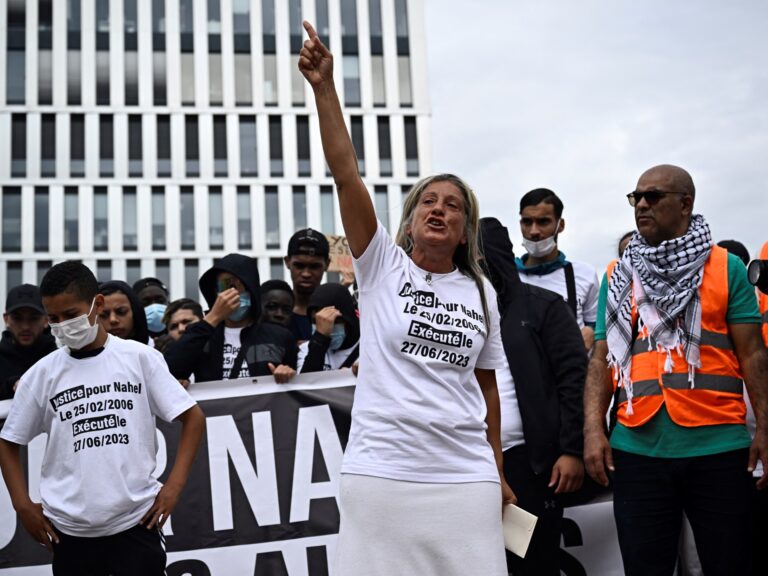This honorary gathering comes a day before France goes to the polls for the first round of early elections, where racism takes center stage in the vote.
A year after a French teenager of North African origin was killed by a police officer, his mother organized a march in tribute to her son that ended at the scene where he was shot without provocation.
Several hundred family members, friends and supporters gathered on Saturday in Nanterre, a Paris suburb, to pay tribute to Nahel Merzouk17-year-old, who was shot dead at point-blank range by a police officer during a traffic stop on June 27, 2023 – a murder that sparked shock and days of riots across France.
His mother, Mounia, addressed the crowd, then walked away in tears. Friends wore white T-shirts with Merzouk’s photo and residents of his town held up a banner reading “Justice for Nahel.”
The march ended at the spot where he was killed and an imam sang and read a prayer. Although there was no visible police presence, organizers recruited guards to keep the event secure.
The procession took place at a politically tense moment, when hate speech is ravaging the campaign for early legislative elections on Sunday. And when an anti-immigration party – which wants to strengthen the powers of the police to use their weapons and which has historical links to racism and anti-Semitism – is leading in the polls.
Merzouk’s mother asked politicians to stay away from the march to avoid tensions. “I no longer have Nahel. I just want justice for my son,” she told the crowd.
“This march is a strong symbol,” said Assa Traoré, 39, who has been fighting for justice since her brother Adama was killed in police custody in 2016.
“This means that history cannot be written without us. We, from working-class neighborhoods, are the first victims of these elections. We realized very early that National rally and far-right parties were a danger to our country and will weaken it,” said Traoré, who has roots in Mali.

“Racial profiling is our daily life”
Reporting from Naterre, Al Jazeera’s Bérard Smith noted: “Nahel’s death has fueled the notion that French police use excessive force and get away with it.” The office of the United Nations Commissioner for Human Rights said the shooting was “a moment for the country to seriously address the deep-seated problem of racism and racial discrimination in law enforcement.”
On Sunday, French voters go to the polls in the first round of voting for the National Assembly, the lower house of parliament, which could lead to the country’s first far-right government since the Nazi occupation of World War II.
Citing “security concerns”, particularly in housing estates and other disadvantaged areas of the French suburbs, the far-right National Rally (RN) party wants to give a new specific legal status to the police.
If police officers use weapons during an intervention, they will be “presumed” to have acted in self-defense. Currently, police officers have the same legal status as all French citizens and must prove that they acted in self-defense after using a firearm.
Meanwhile, the left-wing New Popular Front coalition wants to ban the use of certain police weapons and dismantle a notoriously violent police unit.
“People fear a victory for the RN party. People in working-class neighborhoods are afraid every day that our sons, brothers or husbands will be killed. Racism and racial profiling are part of our daily lives,” Traoré said.
“Conflicting loyalties”
Friday, the RN faced new accusations of racism with a senior parliamentarian saying that a former education minister of Moroccan origin should never have been given the job because of her origins.
MP Roger Chudeau said the appointment of Najat Vallaud-Belkacem to the education portfolio in 2014 was “not a good thing” for France, saying her French and Moroccan nationalities meant she had “loyalties contradictory”.
These incidents, however, did not affect the popularity of the National Rally.
Opinion polls suggest the RN party could dominate the Next parliament After the second round of voting on July 7, Macron could thus retain his post as Prime Minister. In this scenario, he would retain the presidency until 2027, but in a significantly weakened role.


